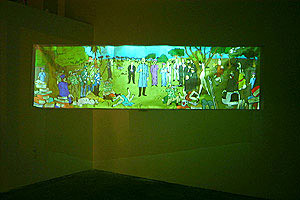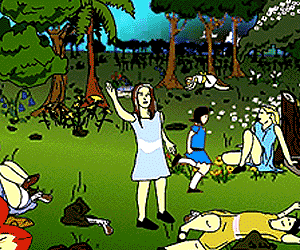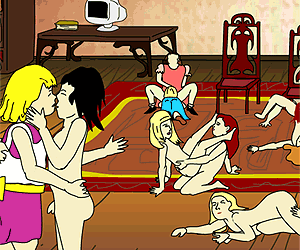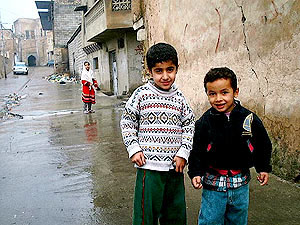Interview with Paul Chan
by Alina Viola Grumiller
"Hope of Escape"Paul Chan might be my lover, which makes me inclined to say great things about him. But he is also an artist who engages me on levels of desire beyond copulation. His art is rich with questions about our present, telling us about utopian futures from the past that we have neglected to consider.
"Happiness (finally) after 35,000 years of civilization", started off as an online animation project. But ultimately it took the form of an installation. It reinterprets the drawings of the artist Henry Darger and the writings of Utopian socialist Charles Fourier, exploring Western concepts of Utopia and the struggle by which we create a fair, pleasurable and self-sustaining society. The friction "Happiness (finally) after 35,000 years of civilization" creates embodies his affinity for social and aesthetic juxtapositions. It is an escape, and ultimately a critique of the world we live in, pushing us to re-think the structures of our language that have formed our thinking of it.
Besides creating visions for a possible world, he has also visited a world that ceased to exist in the "real" one we live in: Iraq. Paul was a member of the Iraq Peace Team, living in Baghdad from December 2002 until January 2003, documenting the story of our administration's unspeakable drive for war and the people caught in its path.
Susan Sontag writes in her new book Regarding The Pain of Others, that "Compassion is an unstable emotion, it needs to be translated into action, or it withers". Going to Iraq seems to be contradictory to his escapism in "Happiness (finally) after 35,000 years of civilization". However, isn't it through contradiction, that things and ideas become unhinged? And doesn't his work in politics push the questions he asks in his art?

Front views of “Happiness (finally) after 35,000 years of civillization”
Alina Viola Grumiller: Why do you choose to work in new media?
Paul Chan: Partly out of necessity and partly out of chance. I certainly didn't choose it. It chose me because the time in which I studied dictated certain techniques of art-making and in the mid-nineties the Internet became an exciting thing. I certainly didn't start with the Internet stuff. Actually in school I didn't do any artwork at all. I did journalism and labor organizing at the Art Institute of Chicago.
It was not until after school that I started dabbling in new media and seriously considered video as a medium to make work with. But that was because I didn't want to paint or draw. Performance was there but I didn't want to do it. I didn't want to work with other people. So it was almost a matter of deduction. "What don't I like to do?" The more you ask that, the clearer the answer became not by choice, but by deduction.

Closeup of scene from“Happiness (finally) after 35,000 years of civillization”
AVG: You do a lot of political/activist work. You went to Iraq with the Iraq Peace Team (a campaign of the Chicago based activist group Voices in the Wilderness) and you are the "director" of National Philistine, an online political-aesthetic-think-tank. How do you negotiate your political work and your art?
PC: I try not to mix art and politics. I have certain political needs and so I fulfill them by doing political work. I have media skills. I know how to edit video and make web-sites, I know certain principles of design and aesthetics, and these skills become useful in campaigning and organizing, or propagating information.
Art is completely different, as it must be. I'm not looking to spread information or organize ideas and people when I make art. Politics demand the force of speech to articulate answers to present questions. Art demands a kind of speechlessness that gives space to pose new questions for possible futures.

Closeup of scene from “Happiness (finally) after 35,000 years of civillization”
AVG: Looking back these past months, a lot of people have described themselves as "utterly speechless". The aftershock of 9/11, the war on Afghanistan, the war on Iraq. No articulation of speech or order of language seems to be able to represent this chain of disasters. How does your work offer an alternative to – let's say – traumatic experiences pressed on us every day by the numerous media outlets? And do you actually consider media to be a traumatic experience?
PC: Media is not traumatic per se. There is no such thing within the DNA of media – whether its mass media or independent media – that determines it to be traumatic. It is a particular ideology that drives the media that makes it traumatic because it perpetuates certain modes of consumption and reception. Pace Biggie Smalls (AKA the Notorious B.I.G., the slain rapper), politics is always already about money, power, and respect. Media becomes traumatic when it perpetuates this closed circuit without hope of escape, closure, or system crash.

Iraq street snapshot, January 2003 by Paul Chan
AVG: Philosopher Slavoj Zizek says in his book The Fragile Absolute: "[When] we are confronted with an image of that deep horror which underlies our well-ordered surface, we should never forget that the images of this horrible vortex are ultimately a lure, a trap to make us forget where the true horror lies."
How do you/we know horror without being horrified?
How do you/we know trauma without being traumatized?
PC: I don't know.
What has been traumatizing in my life?
Oh well that's easy, it's a recognition of repetition. I mean, trauma is the recurrence of something that one wants to revisit without really knowing the cause of the effect of the repetition. You just see the repetition. SARS coverage becomes traumatic. It repeats but within the same cycle of cause and effect and it not only seems "natural", there is no stopping it, even though you realize that there are certain answers and questions that could be aired to stop the cycle. That's the first step in transforming trauma: through the recognition of repetition. And the non-variants of that repetition, that it literally becomes repeated as opposed to varied. Which is the pattern of understanding, I suppose.
AVG: As we have been talking about trauma, disaster – The question for me becomes, what do we do with the feelings that have been aroused? New things emerge, in order to resolve a tension within the old things that in fact were already present that were only in a "Gestalt" of a longing.
If I say, a New World demands a new language, do you think that we can recruit media for this task?
PC: No. Maybe. No.
There is no media without people and so people first. It doesn't matter what media it is, actually. New media formalizes the inexplicable connections between people, things and places. It is appropriate for our times because within the form of new media, we see how terribly interconnected we all are.
New media combines film, video, speech, text, and design in a sort of hybrid that in and of itself does not sew seeds of possibility for something different or something new. I mean, we are still playing with the stuff we have always known, so it's simply symptomatic of the interconnection we have, but that does not give it more of a possibility of transforming what we see around us.
AVG: Has your journey to Iraq changed your work? Has it given you a new language for politics or art?
PC: Iraq made me more extreme. The trip and the work were a multi-angular phenomenon. I can't use everything that I felt and thought in my artwork because it doesn't translate well. It doesn't translate well because number one, it distorts the original conception of what that experience was and number two, if I decided to distort it, it may not resonate as fully as I want them to in artwork – as contradictions, paradoxes, etc. There are no answers in art; in fact there are no ideas even. So how do you transform experience into non-ideas, or how do you make ideas collide and collapse in art becomes the essential question?
A new language is essential, but a new language is new because no one recognizes it, ergo, you can't use it. It can only be a bookmark for something we haven't thought of – but can't be useful and so it can't be political because anything that is political must be useful. Politics is about answers to present questions. Art is about questions; questions that we don't even know how to ask yet. It's clear that radical change, radical political change comes from ideas that are already in the air, using a language we already know, and that it is through either distortion, chance, or luck that things pop up, and of course human agency.
Martin Luther King JR's ideas were not radical; they were only radical in terms of how they colluded with action and history. So action becomes the aesthetic horizon from which politics enter into the world.
The people I went to Iraq with, their ideas were neither new nor necessarily radical: since there have been wars there have been anti-war protesters. But what they did was radical. They went to Iraq and believed – hope against hope – that they could be a radical part of a new constellation of people all over the world that stops a war.
AVG: Is this possible with the new collective language of the Internet? Is this language, through its global reach and ambition, the foundation of a new form of participatory discourse? And do you think this discourse leads to new and liberating forms of politics?
PC: No.
(Pause)
Don't get me wrong. I think the Internet is wonderful. There is no way people could have organized the way they did without the Internet. But the more connected we are, the heavier everything becomes. This movement is in fact a double movement. First, it is liberating because global electronic communication allows us to organize and communicate anywhere and everywhere at an instant. But second, it is also traumatizing, since there is no escaping this electronic boulder on our shoulders, this burden, and this implicit responsibility of stopping the tragedies, the barbarisms, and the tyrannies that happen throughout the world because we are now inextricably connected to them. It is a double movement and it immobilizes us. We are more immobilized than we were before. I think the trick is to not necessarily go beyond these two movements but to somehow make them work with each other and for each other in a sort of micro-movement. You can't escape either of them anymore. We have to somehow acknowledge the trauma of knowledge in order to transform it into a kind of ignorance that becomes action.
AVG: Your piece, "Happiness (finally) after 35,000 years of civilization", takes into account the very crushed utopian hopes of two people who were themselves crushed by history. In a way, you've resuscitated their utopias. So what's so great about utopias?
PC: It's great because it's a proxy that stands in lieu of absolute freedom, which is both liberating and frightening. And to imagine what this looks like is, in the end, an exercise in hope. "Happiness (finally) after 35,000 years of civilization", is essentially three people, two dead and one alive who get together and talk about what utopia would look like and then as they talk they realize they don't agree and everything falls apart. Building and destroying utopian ideas become the process of play from which "Happiness..." comes out of.
AVG: What I really like about your work is that it shows the possibilities for disagreements/disorders that lead to a productive end. So, maybe traumatic experiences allow us to reset our lines. Is this an important way for new ideas to come politically and artistically?
PC: I think it's important to remember where these lines are being drawn; within the philosophical, economic, and social parameters of art, as opposed to politics, and this sort of freedom is exhilarating but impotent. Again, to mix. This is where we get into trouble. To mistake the freedom in art for the freedom and liberation in politics is to be disingenuous about both. The freedom in art translates as pure impotence in politics and the freedom of politics means among other things the destruction of art.
To mistake art making as a form of political work I think is fine, but in the end does a disservice to art. It doesn't mean that artists can't be political activists or that art can't have a political resonance. It simply means that we must be aware of the power and the impotence that is the social and historical fabric of contemporary art.
© Alina Viola Grumiller, 2003
For more information about Paul Chan's work please visit: www.nationalphilistine.com
Alina Viola Grumiller is an artist who lives and works in New York. www.utopiantongue.com